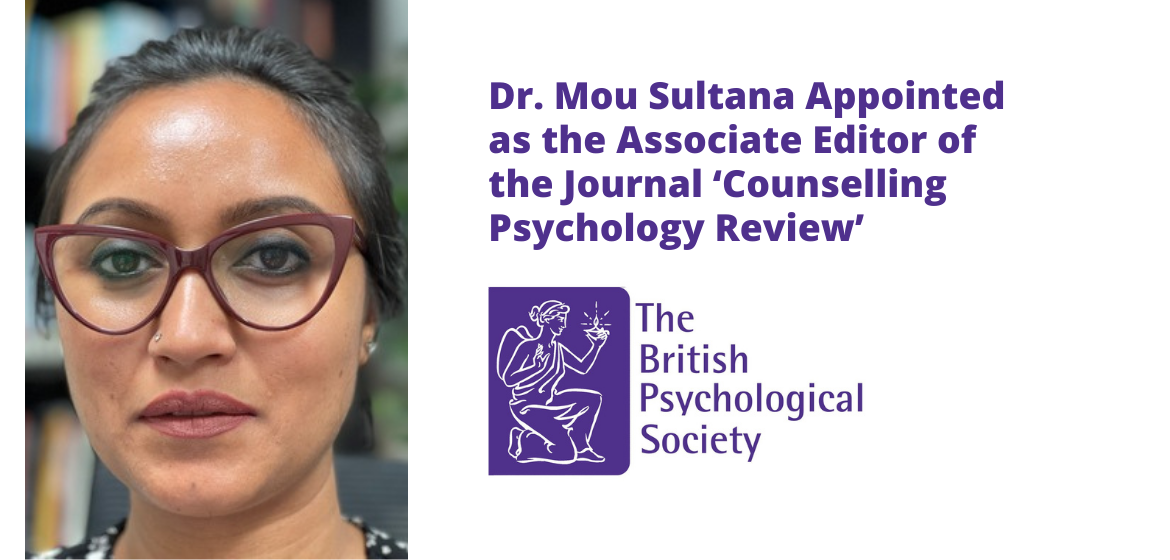
Dr. Mou Sultana Appointed as the Associate Editor of the Journal ‘Counselling Psychology Review’
Dr Mou Sultana who is a lecturer here at ICHAS has been appointed as the Associate Editor of the Journal ‘Counselling Psychology Review’, from the British Psychological Society. She will also be presenting at the 17th European Congress of Psychology in July 2022 which is a wonderful achievement. Here she talks about her new role, presenting at the congress but also about the Introduction to the Integrative Perinatal Counselling Model short course that she is hosting this month.
Tell us about your new role as Editor of Counselling Psychology Review?
So the new role is associated editor of Counselling Psychology Review, that’s a journal from the British Psychological Society. I have to work with the editor in relation to the new submissions that are coming in, putting these through the reviewers or getting them rewritten by the authors and also get a list of reviewers sorted if the topic hasn’t been discussed before.
I’ll also be liaising with the authors throughout the process and go through the submissions suggesting edits, liaising these with the reviewers, finally sending them to the editor for their final decision on the articles.
The Counselling Psychology Review is published twice a year by the British Psychological Society. It’s a peer-reviewed journal and is run by counselling psychologists and the reviewers are mainly counselling psychologists. Now there’s a lot of overlap with psychotherapy and counselling psychology. So there are a lot of therapists who are also qualified psychologists on their review panel.
Submissions to the Counselling Psychology Review journal are welcome from counselling psychologists. The journal and the work entails a lot of time and energy. I’m delighted to have been secured this role.
You will also be speaking at the 17th European Congress of Psychology in July?
Yes, my presentation will focus on parental alienation from a domestic violence perpetrator worker’s perspective. So that’s, that’s a mouthful. In the short-term parental alienation is a concept that is neither a psychological phenomenon nor a psychological term. But it’s a legal term that people are using to make decisions in the legal world in terms of child custody or to decide the fate of parents or the fate of the child themselves. There are a lot of discussions and debates about this topic in the legal world and psychology as there’s a lot of overlap between the two but this is not a scientific psychological term. The term does not exist in the DSM-5 or the ICD-11 but exists in the family courts used by legal professionals across the world.
There’s very little evidence-based practice on this term, because when we talk about evidence-based, we’re talking about quantitative studies or qualitative studies or mixed methods but these studies do not usually use these methodologies, as it would in other fields, because as you would understand judicial processes in the Family Courts are mainly ‘in camera’ to protect the identity of the minor, which means you do not talk about it outside.
So a lot of the cases that you would count them as a number, let’s say, an instance where parental alienation was ‘established’, you would say, well, it is because the court ruling is an indication that this is a parental alienation case. So apparently what happened, in this case, was decided by the ruling, not the process of ‘establishing’ parental alienation. In this way when you take that number as an instance, as a researcher, there’s a huge question about the validity of that number, because the parents didn’t come up and say, well, they found it wrong, or they didn’t find it, or that this lawyer argued better than that lawyer, the person who found it wasn’t qualified which is often the case in Ireland and a massive fault in the system etc. etc. So the parents are not allowed to speak about these cases. So what you get is the court’s decision about the cases and that ends up as an instance of the occurrence of parental alienation.
A huge problem from a research perspective. So there’s a lot of debate about this. One aspect of it that’s missing in the literature at the moment is the domestic violence perpetrators. Because that’s the domain where you don’t see it as extreme male patriarchal ideas or extreme female matriarchal ideas, mother’s right vs father’s rights, but rather, both and the children’s rights because at least the domestic violence perpetrator work that I do, we would put both moms and dads in the same pedestal, despite who has access to a child or not, because the parameters are abuse vs respect. Both parents are equally able to do so even though legally they’re not found to do so. So from that perspective, parental alienation accusations adds a very different dynamic or dimension. You see parental alienation is often used by the perpetrators as a cover-up for their domestic violence or sexual abuse. Parental alienation cases are also used by the perpetrators to continue with coercive control and inflict ‘paper abuse’ on the ex-partner. Ex-perpetrators may also engage in behaviour that contributes to the child disrespecting the abusive father. These are the intersections that my presentation highlights as I work with Men Overcoming Violent Emotion (MOVE) Ireland, a domestic violence perpetrators programme, this perspective is missing in the existing literature on Parental alienation.
How has the profession evolved over the last two years?
I’d say it has taken a whole new turn. I would say it has expanded opportunities for people who otherwise would not have had access to client work. For example, young therapists have much more opportunities to do work having direct access to clients. Therapists who are not located in big cities now have more opportunities to do client work. Clients who are not located in major cities too have more opportunities to be matched with therapists who probably they wouldn’t have found in other ways.
The distance work has a lot of parks in that way. There’s a lot of interest in the therapy world in terms of, you know, the tactile domain, the loss of human connection in the virtual world. Look, I teach emotion focus therapy. So I’m well accustomed to the whole idea of process experience, and everything else. I value those elements of course. So I understand that a lot of people would be missing out on the experiential aspect of it, and the tactile aspect of it in the virtual sessions. It can be argued that it is missing in online sessions. So I understand that a lot of people will find it very difficult to continue in this changing world. Equally, I think a lot of people are benefiting from it from a social justice perspective, or from the ‘matching clients and therapists’- perspective.
Could you also tell us more about the course you’ll be running this month?
Yes, I am doing the Introduction to the Integrative Perinatal Counselling Model short course. This is pretty much the only course that will give you a heuristic or a grounding framework to work with the perinatal clients within the perinatal field. It expands the meaning of perinatal, beyond the usual medical understanding of it, which is you know, usually from the gestation period three to four weeks to post-birth, one or two years. This conceptual framework expands the term to the pre-conception phase which is usually the Assisted Reproduction phase otherwise known as ART, the phase before you get pregnant, where you are trying to get pregnant, and also expands the phase to up to five years post-birth with or without the child.
So that’s the whole psychological framework for the perinatal period being proposed in this model along with a framework of working therapeutically. To work within this field, you’d have various different types of clients, clients who are thinking of pregnancy, who are not thinking of pregnancy but bothered by the question of a baby, those who are looking to break up because of the decision to not be pregnant, those who are you know trying to see a partner because they want to become parent, there are all sorts of scenarios and then you have people who are actually pregnant or have delivered or has a miscarriage or has pregnancy loss or child loss. Then you also have young families who have children under five.
So there’s a wide variety of people that you would see in this period, because of this expanded definition of the perinatal period in terms of this conceptual work. This course basically provides you with a kind of a skeletal approach that you can merge with your existing ways of working therapeutically. So this is not a therapy, per se, but this will provide you with the conceptual tool for working therapeutically. It is a model that you use to structure your existing work.
If you want to learn more about the Introduction to the Integrative Perinatal Counselling Model check out the course page today.























